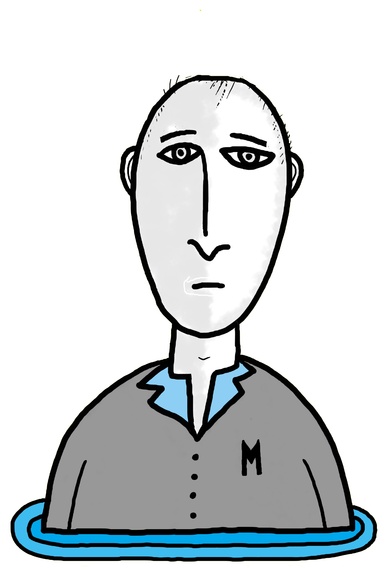When Grammy-nominated musician Peter Himmelman began his musical career in Minneapolis in the late 1970s, the biggest hit on local radio was Prince's "Soft and Wet," a funky seduction number. Himmelman figured he could get famous by writing songs like that, so he penned "Baby let me be your cigarette" and "I'm your Fireman," with lyrics like "Show me where you're burning, I'll be there to hose you down."
But while he was playing these songs around the Midwest trying to get his big break in the music industry, his father was dying of Stage 4 lymphoma. The night before Father's Day, Himmelman came home from a gig and sat down to write a song for brunch the next morning. His mom had said, "Peter, write a funny song to cheer us up." They knew his father wouldn't live to see another Father's Day. He began strumming some chords. "And suddenly," he told me, "nothing appeared." In the dead of night, his fears slipped away and he found himself in a completely empty space. And from that emptiness came a song about how much he loved his dad. He recorded the finished version to play the next morning, but at the end of the recording he broke down in sobs. "It was on tape all this blubbering and tears," he said, "And I'm like, 'Oh, no, I've got to erase that.'" But because his fears had left him, he kept it on the tape.
The next morning Himmelman came to the brunch. The table was laid out with smoked salmon, the members of his family maintaining an effortful cheer. And then he played the recording. "People were crying. They couldn't stay in the room. My father and I were up together hugging one another crying. The song brought us together in an incredible way." A year later, Himmelman put the song as the centerpiece of an album that launched his career as a singer-songwriter and got him his major label record deal.
Since then, Himmelman has made a life's work of learning how to overcome his fears and, more recently, helping other people overcome theirs. In the past few years he has been offering seminars through his company, Big Muse, on how people can unlock their full creative potential. "Mostly what I found was that people were circumscribed by their fears," he said. "Not only their fear of letting their ideas go out to the public, but even to register on the screen of their own conscious minds."
Himmelman came to understand this fear as a character who lives inside us whom he named Marv. Marv is our inner self-protecting mechanism. His origin is in the fear of shame and abandonment. "Marv is not a demon that we need to cast out or kill," he said. "When we're trying to create something new or develop a new idea, the sense of fear tells us, 'If you fail, if you garner shame, you may be abandoned and that abandonment will lead to your death.'" So Marv whispers in our ears that we can't do it. That we might as well give up. That we don't have what it takes. That we're going to fail.
When we assuage Marv, he clears up space for creativity to happen. That space is where Himmelman was when he wrote the song to his father. It is a place where wonder and joy and vulnerability can happen. "That space of emptiness where Marv departs allows us to divorce ourselves from our assumptions about our limitations," he said. "It's amazing what nothing can do."
How can you silence your inner Marv? Most people tell us to focus inward and talk ourselves out of our fears. This cognitive approach is exemplified by an article in the November issue of Harvard Business Review by Susan David and Christina Congleton. They argue that getting rid of our inner critic requires recognizing it, labeling our emotions, accepting our fears, and acting on our values. Himmelman offers a way that is more from the heart than from the mind. He brings in the emotionality of rock n' roll to do something that no amount of self-talk can accomplish. He disarms Marv by getting people to express their love and connection to others.
Himmelman provided a striking demonstration of one of his fear-liberating techniques at Chicago Ideas Week, Chicago's annual gathering of global thought leaders created by Groupon co-founder Brad Keywell. He told the audience, "What I want you to do right now, and I'm the only person today asking you to do this, is to take out your cell phone and turn it on." He then instructed us to take one minute and 45 seconds to write a message to someone we love and tell them how we feel about them. When everyone was done, he told us to send it. People gasped. Some became teary. When we hit the "send" icon, Marv was gone. The act of expressing our emotions and vulnerability freed us from the fear of shame and abandonment that are Marv's main concerns. And it was exhilarating.
Himmelman's key insight is that anybody who can fearlessly access and communicate their deepest emotions will be free of their fears and capable of realizing their full human potential. They will write great songs, start new businesses, come up with great ideas, and achieve greatness in their work. Though concrete exercises, Himmelman shows people how to make their fears go away. The results, according to clients ranging from big corporations such as Gap, McDonalds, and Pandora to hospitals, nonprofits, and academic departments, is a lasting boost in confidence and creativity.
So go ahead, take our your phone. Write someone you love how you feel about them. And press "send."

